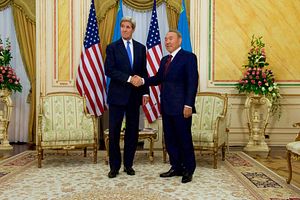It’s no surprise that much of the focus of U.S. Secretary of State John Kerry’s recent swing through Central Asia centered on shoring up relations with the five nations. Not only had Washington let relations wane considerably over the past few years, but the U.S. pushing largely fruitless projects like CASA-1000 and the TAPI pipeline all but guaranteed that relations would get bogged down. Moscow, however, has proven more than willing to entrench its interests in the post-Soviet sphere since President Vladimir Putin’s return to power. Toss in soaring Chinese investment and a nominal U.S. wind-down in Afghanistan, and it makes a certain sense why the U.S. would see its accounts with Central Asian leaders slip.
Still, Kerry saw the trip as an opportunity to help mend frayed ties in Kyrgyzstan and Tajikistan, as well as a chance to touch on human rights issues scouring the region. (When the State Department wasn’t helping expel American reporters, at least.) One aspect of the trip thus far overlooked, however, stems directly from Russia’s invasion of southern Ukraine, and the fallout within the former Soviet space. Not only was Kerry a visible presence of American interest in the region, but he made sure to tout the inviolability of the post-Cold War order in the post-Soviet space – namely, as it pertained to sovereignty in Central Asia.
While in Kazakhstan, Kerry made special note of the United States’ continued support for Kazakhstan’s sovereignty. As a joint statement read, “Kerry expressed the United States’ unwavering support for Kazakhstan’s sovereignty and territorial integrity, and congratulated Kazakhstan on the 550th anniversary of the Kazakh Khanate.” Kazakhstani President Nursultan Nazarbayev responded in kind: According to Voice of America, “Nazarbayev said he was ‘grateful’ for the ‘permanent support’ of the U.S. for Kazakhstan’s ‘sovereignty and economic development.’”
The topic of state sovereignty, of course, remains a heated one throughout the former Soviet Union. (Or a potentially preposterous one, for certain actors in Moscow.) Ukraine aside, Putin sparked a wide round of concern through the region last year, lobbing questions about the legitimacy of Kazakh statehood and recycling rhetoric he used to back Russia’s Ukrainian invasion. A rattled Kazakhstan promptly responded by announcing celebrations for the 550th anniversary of statehood. Putin has since refrained from commenting on the sovereignty of Kazakhstan – which maintains a substantial ethnic Russian population in its northern stretches – but myriad Russian actors, from all sides of the political spectrum, have picked up the baton. Hence, Kerry’s comments.
But while it’s easy to scoff at Kerry’s rhetoric – Central Asia, after all, remains about as far afield from U.S. military presence as any region – it’s worth noting that the secretary of state is one of the most prominent American officials on record as supporting increased American arms to Ukraine. The U.S. may not see any imminent, notable transfer to Kazakhstan, but Washington certainly hasn’t shied from supplying the region with American military hardware, with little regard for humanitarian concerns. Russia has taken note, and will certainly perk its ears at Kerry’s comments. Numerous steps remain should Kazakhstan see a reprise of a Ukrainian scenario on its territory, but Washington has responded to Moscow’s rhetoric – with Astana no longer sure of the latter’s respect for any sovereignty in former Soviet territory.

































